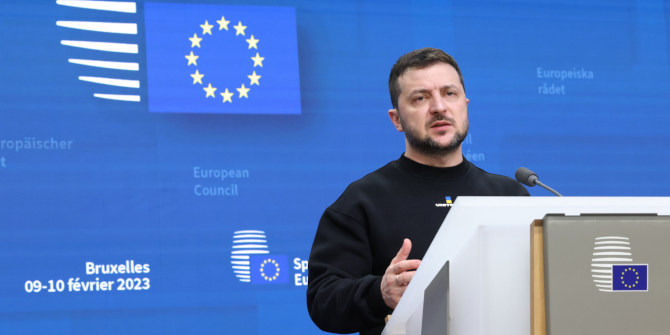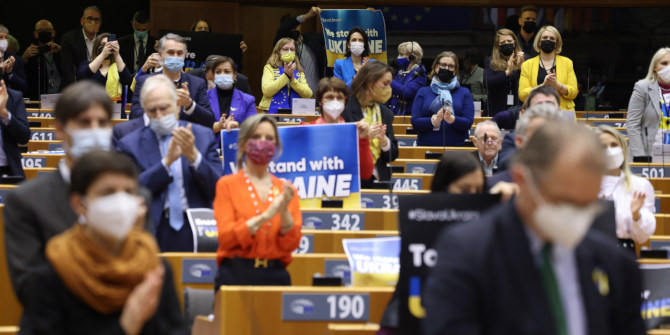Today is the first anniversary of Russia’s invasion of Ukraine. Fabienne Bossuyt assesses what lessons we can take from the invasion and the war one year on.
The first anniversary of Russia’s invasion of Ukraine compels us to reflect critically about the lessons that policymakers and scholars from the EU should draw from the war. It should also prompt us to assess what the future might be for the EU’s relations with Ukraine and Russia.
The importance of ‘in-between countries’
First of all, for scholars like myself who study the EU’s engagement with the post-Soviet region, one crucial lesson that has emerged from this war is that we have for too long overlooked the agency of the so-called ‘in-between countries’.
We have been preoccupied with looking at the region through the prism of EU-Russia competition over their so-called ‘shared’ neighbourhood. In so doing, we have become obsessed with the agency of the EU and Russia, fatally ignoring the agency of those states situated between the two actors. If there is one thing this war has shown us, it is that those ‘in-between countries’ clearly have agency and that their agency matters hugely.
Understanding Ukraine
When it comes to Ukraine, the war has painstakingly revealed that we knew embarrassingly little about this country before Russia’s invasion. Both scholars and policymakers would be obliged to admit that up until the start of the war, Ukraine remained something of a blind spot. In fact, the little knowledge they did have of Ukraine frequently proved to be either incorrect or biased.
If we had known more about Ukraine, we might not have been surprised at the country’s exceptional resilience under Russia’s military invasion. Indeed, the Ukraine that was once routinely described as a corrupt, dysfunctional, and deeply divided state, turned out to be far stronger and institutionally robust than we imagined. It now appears reunited by civic nationalism and is presented as leading the battle of the liberal world against illiberalism.
The war has also revealed that Ukraine is not Russia, or rather, that Ukrainians are not Russians. Many mistakenly perceived Ukrainians and Russians as an intertwined people. The last twelve months have exposed this misunderstanding. We now see two distinct peoples from very different societies and civilisations.
We now know that Ukrainians look at their relationship with Russia in postcolonial terms. Had we known this a year ago, we would very easily have understood why Ukrainians would be willing to fight so bravely against the Russian army. For them, the current war is the final stage of a 300-year war of national liberation, which they saw as postponed but not fully completed in 1991 with the collapse of the Soviet Union.
Ending the war
As debates within the EU are now starting to focus on possible peaceful resolutions to the war, these insights need to be carefully considered. Clearly, the EU and its member states will want to be on the right side of history, and they will want to claim a stake in any peaceful solution that follows the war.
Irrespective of how the conflict evolves from here, we need to understand why Ukrainians are likely to be sceptical about any calls for peace, including those coming from western capitals. While the West and Europe are seen as Ukraine’s allies, the EU and its member states have to be careful not to fall into the trap of imposing their worldview onto Ukraine. Instead, they must acknowledge Ukraine’s agency.
As the Ukrainian intellectual Mykola Riabchuk has said, there is a fear among many Ukrainians that peaceful solutions emanating from the West will reflect the old-fashioned imperial view of the ‘Orient’ as a region lacking agency of its own – a region best managed by western masters, peacekeepers, and intermediaries within agreed spheres of influence. Now that the EU is serious about becoming a geopolitical actor, it may want to certify its sphere of influence in any post-war scenario for Ukraine.
This brings us to the question of what role Ukraine will be given by the EU in the country’s post-war recovery. In the post-war era, the EU will want to profile itself as a benign power, which generously offers aid to help poor Ukraine recover and become resilient, not only against Russia, but also against the dark forces of illiberalism and democratic backsliding.
And of course, as a candidate member of the EU, Ukraine will also be offered specific aid from the EU to help the country prepare for its accession to the EU. But what voice will Ukraine be given in all of this? And will Ukraine be entitled to make its views heard, or is it merely expected to accept and follow the instructions and requirements of its generous benefactor in Brussels?
Lessons for the EU
It is no exaggeration to state that the likelihood of Ukraine becoming an EU member state in the near future is rather low. In fact, it seems much more likely that Ukraine, much like the Western Balkan countries, will end up frustrated with the EU, as its accession process stalls. Under such circumstances, Ukrainian critiques of the EU acting as a postcolonial power that ignores the voice and agency of its subordinates could create a backlash.
Ukraine, along with Moldova, may thus join an ever-larger group of countries that are stuck in the EU’s waiting room. This is a potentially explosive situation, and it is therefore immensely important that the EU critically reflects on its enlargement policy, and in doing so, gives voice to those states wishing to join.
On this point, let us remember that Russia is currently not just at war with Ukraine, but also with the West. This has been evidenced in both the discourse and the actions of the Kremlin. While Moscow is fighting a military battle against Ukraine, it is raging a hybrid war against the EU and Nato using gas and cyber security as its main strategic weapons.
Of course, we cannot predict the future, but the prospect of Moscow backing down, leaving Ukraine alone and ending its hybrid war against the West seems almost non-existent, at least in the near future. Even if a peace agreement is reached between Ukraine and Russia, it is very likely that Russia will continue to harass Ukraine and that it will continue to take anti-western positions.
Russia’s great power ambitions
The above becomes clear when one considers the factors that triggered Russia to launch its invasion of Ukraine. Both scholars and policymakers in the EU have overlooked the central place that Ukraine occupies in Russia’s historical imagination and identity construction. They have underestimated the lengths to which Moscow is ready to go to regain Ukraine – or, failing this, to destroy it.
At the heart of this conflict lies a combination of Russia’s deep-rooted feelings of vulnerability towards the West, and its great power ambitions, including the conviction that it is entitled to have a sphere of influence in its backyard. Ukraine stands out for Russia as the one country that it cannot risk losing if it is to fulfil these ambitions. This is not only for economic reasons, but even more so, for historical and cultural reasons. Indeed, for the Kremlin, Russia as a nation remains incomplete without Ukraine, and Ukraine thus has no historical right to exist as a sovereign state.
For the elites in Moscow, Ukraine was unlawfully taken following the fall of the Soviet Union – an event the Kremlin views as the ‘disintegration of historical Russia’. Putin and other Russian elites thus see the existence of an independent Ukraine as a symbol of the unjust post-Soviet arrangement, and they view Ukraine’s embrace of the West as an existential threat to Russia. This is why Moscow believes it would be preferable to destroy Ukraine if it cannot be retaken. It is this reality that will form the basis for any post-war settlement.
Normalising relations
All of this begs the question of how the EU and Ukraine can ever regain trust in Russia. There are few easy answers to this question. Russia’s economy is currently far from experiencing the kind of economic collapse that would be required to bring down Vladimir Putin’s regime. Even if the regime did fall, it is far from certain that this would provide the basis for a more positive relationship between Russia and Ukraine.
In any case, now that the EU has fully embraced Ukraine by offering it unprecedented military, moral and financial support to fight Russia, as well as by offering it a path to membership, the EU can no longer bet on two horses. There is no longer room for a Russia-first policy in the EU. From now on, the EU needs to prioritise relations with other partners. This implies, among other things, further decreasing the EU’s energy dependence on Russia as a matter of urgency and giving more agency to Ukraine and the other Eastern Partnership countries in their relations with the EU.
While we can question the effectiveness of the sanctions the EU has imposed on Russia, the EU should continue to impose them as long as Russia wages war against Ukraine and as long as Russia fails to acknowledge its accountability for the war crimes it has committed. Until then, there can be no return to normal relations with Russia.
In the longer term, if a return to normal relations becomes a possibility, the EU will have to be careful about not repeating the same mistakes again. The German policy of Wandel durch Handel – change through trade – has proven to be a gross miscalculation. As long as there is no restoration of trust on both sides, any attempt to build a sustainable relationship with Russia is likely to prove ineffective.
Note: This article gives the views of the author, not the position of EUROPP – European Politics and Policy or the London School of Economics. Featured image credit: European Union





